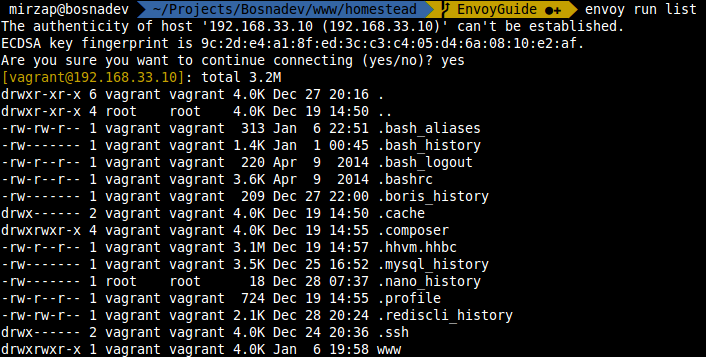Laravel Envoy provides you a simple and elegant way to run common tasks on your remote servers. If you have ever used Fabric, Capistrano or other tools for managing remote tasks, you already have an idea how Envoy tasks will look like.
Laravel Envoy Installation
To install Laravel Envoy simply run:
|
1 |
composer global require "laravel/envoy=~1.0" |
after that, make sure ~/.composer/vendor/bin/envoy is flagged as executable:
|
1 |
chmod +x ~/.composer/vendor/bin/envoy |
For easier access to the envoy command, you should create symbolic link to the ~/.composer/vendor/bin/envoy. On GNU/Linux operating systems, symbolic links are created with ln command:
|
1 |
mirzap@bosnadev:~$ sudo ln -s ~/.composer/vendor/bin/envoy /usr/bin/envoy |
Alternatively, you can create an alias for the ~/.composer/vendor/bin/envoy command. Depending on which shell you are using, in your ~/.bashrc or ~/.zshrc file put this:
|
1 |
alias envoy="~/.composer/vendor/bin/envoy" |
How Envoy Works
To create tasks you use Blade style syntax. Laravel Envoy doesn’t require Blade template engine, it just uses Blade syntax to define tasks. To start, create an Envoy.blade.php in the root folder of your project. Next, create a simple task:
|
1 2 3 4 5 |
As you might suppose, in the @servers declaration we configure our server list. Here you can put your staging, testing or production servers. Then within our @task directive we can tell Envoy on what server we want to execute that task. If you want to execute only on one server, you pass only name you defined in the @servers declaration. If you want to execute task across multiple servers, you simply list them in the @task declaration:
|
1 2 3 4 5 |
@task('list', ['on' => ['homestead', 'staging']]) ls -lah @endtask |
Running Tasks
To run Envoy tasks you simply use run command:
|
1 |
envoy run list |
which will execute the task we defined above. Result is:
 Basic deployment
Basic deployment
I tend to have very simple script when doing deployment, less code – less chance for something to go wrong. With that in mind let’s create our deployment.sh script in the project root folder:
|
1 2 3 4 5 6 7 8 9 10 11 12 13 14 15 16 17 18 19 20 21 22 23 24 25 26 27 28 29 30 31 32 33 34 35 36 37 38 39 40 |
#!/bin/bash function deploy() { # make sure we pull master branch for production environment BRANCH=$([ $1 == "production" ] && echo "master" || echo "staging") echo "Starting deployment on s <$1> environment" composer dump-autoload -o # Start SSH agent & add identity to the agent killall ssh-agent; eval `ssh-agent` ssh-add ~/.ssh/private_key echo "Pulling $BRANCH branch..." git pull gitlab ${BRANCH} php artisan migrate --env=$1 php artisan migrate --bench=bosnadev/some_component --env=$1 composer dump-autoload -o } function help() { echo "" echo " Please specify on what environment you want to deploy: " echo " ./deployment.sh env" echo "" } ## If no argument supplied if [ -z "$1" ]; then echo "No arguments supplied" fi ## If wrong number of argument has been supplied if [ ! $# == 1 ]; then help $# else # We can deploy only on staging and production if [ $1 == 'staging' ] || [ $1 == 'production' ]; then deploy $1 fi fi |
And my Envoy.blade.php looks like:
|
1 2 3 4 5 6 7 8 9 10 11 12 13 14 15 16 17 18 19 20 21 22 23 24 25 |
@servers(['homestead' => '[email protected] -p 2222','staging' => '[email protected] -p 22', 'production' => '[email protected] -p 22' ]) @setup $param = isset($param) ? $param : null @endsetup @task('artisan', ['on' => 'homestead']) cd www/someapp php artisan {{ $param }} @endtask @task('composer', ['on' => 'homestead']) cd www/someapp composer {{ $param }} @endtask @task('deploy-staging', ['on' => 'staging']) cd someapp ./deployment.sh staging @endtask @task('deploy-production', ['on' => 'production']) cd someapp ./deployment.sh production @endtask |
Now, when you want to deploy to the staging just run:
|
1 |
envoy run deploy-staging |
Or if you deploying to the production, run deploy-production task:
|
1 |
envoy run deploy-production |
As you can see, it’s pretty straight forward. Of course, you can create much more complex deployment tasks, it’s entirely up to you. Feel free to share your knowledge and experience with Laravel Envoy, or share your best practices when dealing with remote tasks.
Latest posts by Mirza Pasic (see all)
- Quick tip: How to delete a tag from a Git repository? - August 20, 2016
- Laravel Accessors and Mutators - December 17, 2015
- How to allow remote connections to PostgreSQL database server - December 15, 2015
